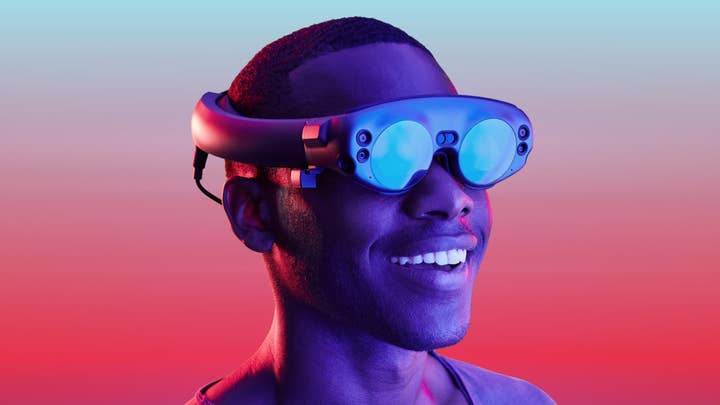Has the VR boom hit a wall?
Enormous progress has been made in headset design and software development for VR - but without a major technological leap forward, current devices won't reach the mass market
Executives leave major companies all the time, and it's important not to read too much into any individual departure; the fate of a company, let alone an entire industry sector, can rarely be read from the tea leaves of a handful of management level career moves.
All the same, the departure of Brendan Iribe from the VR company he co-founded, Oculus, is an interesting point at which to take stock of the state of the VR market. With Iribe's exit, the two most high-profile of Oculus' founding team are both gone - Palmer Luckey departed early last year, possibly fired by the firm's owner, Facebook.
Oculus has been keen to reassure everyone that Iribe's departure doesn't change the company's ambitious plans - the standalone Oculus Quest device and a new version of the Rift headset are on the slate, while an even more ambitious roadmap was hinted at in keynotes at the Oculus Connect developer conference last month. On the surface at least, Facebook still believes firmly in its VR efforts. Former Id Software legend John Carmack is now to some degree the public face of Oculus (alongside fellow Id alumni Michael Abrash) and while his statement on his own plans at the firm ("I do intend to stay at Facebook past the launch of Oculus Quest") wasn't exactly the most committed and confident response to Iribe's departure, it was pretty much the most typically John Carmack response imaginable and likely isn't worth reading too much into beyond its plainly-stated facts.
"The VR boom may be tapering off, and the AR boom may still be waiting for ignition but there's been enormous value in the work of the past few years"
The thing about Facebook's commitment to VR is that intent matters, and it's not entirely clear what Facebook's intent is here. Mark Zuckerberg clearly has some personal affection for VR as a concept and sees potential in the field, but whether he sees VR as a technology whose moment is imminent or as a long-term bet on a sector that will be important years down the line isn't clear.
That's an important distinction, because for all that new VR headsets are still being developed and progressing apace, the market for VR feels rather stalled just now. After years of saying that this year, or next year, would finally be the year when VR broke through into the mass market, is it not time to start wondering if this iteration of VR technology isn't actually going to make that leap?
Plenty of people are already wondering that, as it happens. CCP CEO Hilmar Veigar Pétursson put it most bluntly when he stated last week that the VR market had ended up being too small to build a business on (CCP was an early darling of VR evangelists but exited the sector a year ago).
"We expected VR to be two or three times as big as it was," he told Destructoid; a harsh assessment but one that tracks with the experiences of many other larger developers who have dipped their toes in the space.

What actually is the VR market right now? It's fragmented, for a start. On the PC end of things, where the headset technology is most advanced, the small installed base of expensive VR hardware has become little more then a playground for indie experimentation - which is awesome in many ways, but doesn't actually constitute a commercial market that (many) people can make a living from.
Then you've got Sony doing its own thing with PSVR, which is certainly a market of sorts but not a particularly big one, and one that's honestly lacked a genuinely jaw-dropping essential game since Resident Evil 7 almost two years ago.
"VR this time out was good enough in some senses, but there's another technological breakthrough required before this sector actually becomes more than a novelty"
Finally you have the "toy" VR market - which ranges from an assortment of daft-looking things you strap to your face and stick a mobile phone into up to the altogether more accomplished Oculus Go standalone headset, all of which are largely designed for short throwaway experiences, 3D videos and the likes. That's actually a pretty big market, by all accounts - it's just not one that's particularly relevant to most game creators and smacks of disposable plastic novelty rather than being a sustainable new form of entertainment.
Then there's AR, or "Mixed Reality", which is a leap that we've all been waiting for. I have no doubt that AR is a much bigger potential market than VR, just as I have no doubt that VR is eventually going to be a major form of consumer entertainment - but for now, the potential for rapid advances in AR seem to have been oversold. Magic Leap has done this sector few favours; having talked about changing the world for years, it eventually unveiled a hilariously dorky set of googles that aren't functionally much of an improvement over Microsoft's rather more sensibly marketed Hololens but try to compensate for it with pie in the sky rambling about world-changing potential at some nebulous point in the future. AR will get there, but it's hard not to feel a mixture of disappointment and I-told-you-so at the realisation that the great jump into the future has turned out to be just another stumbling step down a long path.
The VR boom may be tapering off, and the AR boom may still be waiting for ignition - waiting for several years, most likely - but there's been enormous value in the work of the past few years. Not commercial value, as such; some people became very wealthy from acquisitions and so on, but I'm not sure anyone can legitimately say they've made truly serious money, "this is a valid market" kind of money, from selling VR to consumers.

Rather, the value is in everything that's been learned, which encompasses a host of important and interesting things. We know now that the tech is there to produce convincing images properly and developers have learned a ton about how to make VR actually work without making people sick, disoriented or confused. We've even seen some applications both in games and elsewhere that really make sense for the tech. When VR finally steps up and is ready to be a serious consumer entertainment platform, the knowledge and technology created in the past few years will be the foundation of everything that comes next.
The sense that this point really is a few years off, however, is impossible to ignore. VR this time out was good enough in some senses, but not remotely good enough in others; there's another technological breakthrough required before this sector actually becomes more than a novelty. The headsets themselves are a huge part of the problem - even the best-designed and lightest of them are too bulky and restrictive. No matter how much you spend on a headset you end up constantly adjusting and fiddling to get it right - not just once, but every time you put the damned thing on.
Moreover, you're constantly aware of this large, relatively heavy object on your head. Losing the wires helps a lot - it's not surprising that Carmack seems far more focused on the potential exposed by Oculus Go and his hopes for Oculus Quest than on whatever future update to Rift comes along. Even those devices, though, simply aren't what a consumer level VR headset needs to be - slip on, slip off, and damned near forget you're wearing it while you interact with the world.
Until we can get to the point where VR headsets are less like cumbersome helmets and more like sleek goggles - a casual ski mask rather than something that looks (and feels) like a bulky medical device on your face - I'm not sure consumers are ever going to get past that. With our existing technology, that isn't possible. It will be some day; perhaps that's only a few years down the line (waveguide technology is fascinating but still very early, for example) or perhaps it's another decade off, and by the time VR hype builds again the late-2010s VR boom will be remembered much as we recalled the Virtual Boy when Oculus first broke into the market.
When we do get there, however, whenever that may be, the knowledge and understanding gained from the recent VR boom is going to be invaluable to making the experiences that really sell a platform that's finally reached the right stage of maturity for the mass market.
